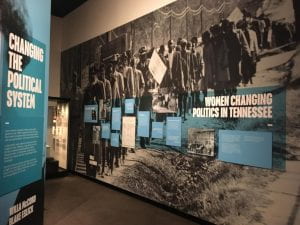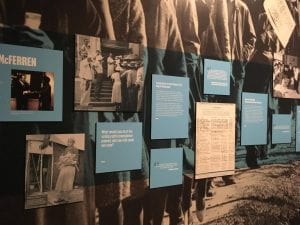 In a great honor to the legacy of her commitment to the right to vote, Viola Harris McFerren, a leader in the Fayette County Civil Rights Movement, is featured in the Tennessee State Museum’s suffrage exhibit “Ratified! Tennessee Women and the Right to Vote.” (Wall Mural: Viola and John McFerren leading protestors to Fayette County, TN Courthouse (1965). Photographer, Art Shay).
In a great honor to the legacy of her commitment to the right to vote, Viola Harris McFerren, a leader in the Fayette County Civil Rights Movement, is featured in the Tennessee State Museum’s suffrage exhibit “Ratified! Tennessee Women and the Right to Vote.” (Wall Mural: Viola and John McFerren leading protestors to Fayette County, TN Courthouse (1965). Photographer, Art Shay).
The Hooks Institute assisted the museum in finding photographs and historical research for this portion of the exhibit. The exhibit is open to the public until September 26, 2021, at the Tennessee State Museum in Nashville, TN.
 The Fayette County Civil Rights Movement was a true grassroots movement that includes a series of civil rights events that took place in Fayette County, Tennessee from 1959 into the early 1970s. One of those major efforts—registering black residents to vote—led to what was called Tent City. As a result of registering to vote, many black residents were evicted from the sharecropper housing that had been home to some families for generations. Ultimately, numerous families had to move into one of two Tent Cities erected on donated land—some living there for more than 2 years. In addition, black residents who registered to vote were blacklisted by whites from purchasing goods and services necessary to survive day to day, such as milk, eggs, fuel, and even medical care.
The Fayette County Civil Rights Movement was a true grassroots movement that includes a series of civil rights events that took place in Fayette County, Tennessee from 1959 into the early 1970s. One of those major efforts—registering black residents to vote—led to what was called Tent City. As a result of registering to vote, many black residents were evicted from the sharecropper housing that had been home to some families for generations. Ultimately, numerous families had to move into one of two Tent Cities erected on donated land—some living there for more than 2 years. In addition, black residents who registered to vote were blacklisted by whites from purchasing goods and services necessary to survive day to day, such as milk, eggs, fuel, and even medical care.
The Hooks Institute’s Tent City website (memphis.edu/tentcity) chronicles the struggles and victories of civil rights era activists in Fayette County, Tennessee. Primary source materials including letters and other materials on this movement are housed in Special Collections, University of Memphis Libraries. Daphene R. McFerren, the daughter of John and Viola McFerren, received a grant from National Endowment for the Humanities to create the core collection.
 “Ratified! Tennessee Women and the Right to Vote” at the Tennessee State Museum uses artifacts, documents, large-scale graphics, videos, interactive elements, and public programming to share the stories of the Tennesseans who came to have decisive roles in American women’s struggle to gain voting rights. For more information on the exhibit, visit the Tennessee State Museum.
“Ratified! Tennessee Women and the Right to Vote” at the Tennessee State Museum uses artifacts, documents, large-scale graphics, videos, interactive elements, and public programming to share the stories of the Tennesseans who came to have decisive roles in American women’s struggle to gain voting rights. For more information on the exhibit, visit the Tennessee State Museum.